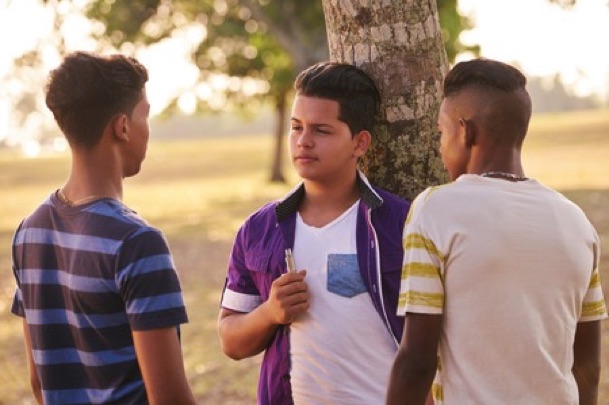
A Program To Help You Deal Effectively with Teen Problems
Staying with it
The teen was smart, attractive, and artistic. Only she didn't or wouldn't go to school. Turns out that lots of times she couldn't. Mom was gone who knows where. Dad was a nice guy who paid the rent and bought the groceries but let himself be held hostage because of his sexual minority lifestyle.
An older brother ruled the roost. Unless he was in county prison. The teen had no quiet, no privacy, no space. One weekend night she came home to find a couple (friends of her brother) doing what couples often do, in her bedroom and on her bed.
The teen got a part time job at a local gas station and stayed with friends and classmates whenever possible. We worked hard with both dad and the brother. Things became marginally better. The determined teen made it through and ultimately graduated.
The other day we received this email message from the state of Washington: "Hello Everyone! I was just writing to tell you how much I miss Choctaw. I know that it was just a stepping stone to life, but I can't help but miss your warm and caring atmosphere. I have been living in Seattle, WA for three years now. I was reading up on the school (nice website, by the way!) and I feel like it has really made a positive impact on my life. Just when I had given up on adults in general, you guys came along... Thanks for everything, and I hope to come visit again one day..."
Finding The
Right Horse
Sometimes it's just a matter of finding the right horse to ride through life. The quiet, friendly teen had been placed on psychiatric medication in first grade. He struggled through most of her elementary school years, was described as sullen, withdrawn, pessimistic.
And he had had several different psychiatric diagnoses. His parents had never married and he and mother drifted from state to state until they once again surfaced in this competitive suburban area. Apparently lacking self confidence and seeking friendship at any cost, he was eventually busted for providing prescription medication (perhaps his own) to other kids at his public school.
He took to Choctaw Ridge like a duck to water. He was cheerful, talkative and outgoing almost from Day 1. He took good natured kidding about his home state and being a "hillbilly" in stride as he sensed it was just talk and non-judgmental. He enthusiastically got into a business class in which students made products for sale and learned the nuts and bolts of basic business management.
But then came the day the product was taken to market. It wasn't the most opportune time to sell a lot of stuff based on the weather and the date. But of the total product sold that day, the "hillbilly" sold almost 50% of it single handedly. Perhaps we have uncovered a new crackerjack salesperson in the making!
Engage and Empower the Peer Group: A Columbine-Virginia Tech Preventive IV
The student was wrestling on a daily basis with the devil. The devil, in this instance, was drug addiction. He had already done jail time. He had already been in rehab. Matter of fact, he had returned to us after several months absence as both of these "remedies" were applied.
Those of us who have been there know what an awful struggle this is. He returned totally bound and determined to prevail. But slowly, this particular devil began to seize the upper hand. He was still functional enough to make school most of the time; still able to do some school work. But because of his desperate inner struggle, he expressed his unhappiness and frustration through completely negative social interactions with classmates. He tried to talk a 15 year old into smoking (cigarettes). He invited another 15 year old to "go party" with him.
In community (group) meeting one day, an astute student described him as being "toxic" to the entire school. From then on, other students instantly began describing all his "toxic" communications as stemming from his personal struggles with life and his particular "devil." All of a sudden they were able to counteract his destructiveness and consistently paint him into a corner in a positive way. The students now had a handle on him and were able to shield more vulnerable students from his (negative) influence.
And then, miracle of miracles, he acknowledged relapsing (into further drug use). And he got it together the last few months of school. He did a great job on his senior project, demonstrating superior research and information-organizing ability. And the Monday after completing his school obligations, (and graduating!), he signed himself back into inpatient drug rehabilitation.
A Young American Life:
Failure or Slow Learner?
At the age of nine, he was introduced to marijuana by his own kinfolk. His child protective services file contained report after report about incident after incident. And he had often been "pulled" from his family and placed elsewhere only to be (eventually) returned.
He arrived at Choctaw Ridge Academy with a basket full of medications and a bushel full of psychiatric diagnoses. Translation: He was smart but suffered from biologically based learning difficulties.
Then one day he was busted for law violations, placed on probation, and, by Court Order, moved to the home of his grandparents, perhaps the only stable family he had. Slowly, he got a grip. The medications and psychiatric nomenclature disappeared into the mists. He did well until the day he was released from Probation supervision whereupon he quit school, left his grandparents, and returned to his mom. He seemed to do well in the work world and visited now and then on "special occasion" school days.
The now 19 year old was "early for school" the other day. We found him outside waiting for us one morning. It was the day before he was to begin serving a 6-25 month sentence in county prison for a crime the Sheriff described as "obviously drug related." (The teen himself was not an addict but we can't speak for his family and associates.) Interesting that he chose to spend some of his last hours of "freedom" with us. Maturing adolescents almost always will choose their own "therapist" when they're really jammed up. The teen was very forceful in talking with our current students and repeatedly described himself as "a !*%*#@& idiot." He promised to work on his GED while incarcerated and to earn his way out in time for our school Christmas party.
How do we best protect society from people like this? Blanket-no-nonsense-one-size-fits-all approach? Or by an individualized response that considers Zero tolerance, because everyone "has a story" and most of us are fed up with hearing them and only want stability and predictability? Or to use either zero tolerance or compassion or some combination thereof?
Update: October 2017
This young man is now married and a father, owns his own house and with a friend has a successful landscaping business throughout the county. Voila!
The Color of Guts
He was a complete and total baby. The 16 year old couldn't even handle an evaluation/assessment. Halfway through he ran screaming upstairs to his room. I guess when the youthworker started asking him about what he'd been busted for, the poor thing couldn't handle it. Or reality.
And mom, and a little bit dad, covered for him shamelessly. Attending Choctaw Ridge Academy on a daily basis, and staying the entire school day, was an outrageous demand. And he had been repeatedly evaluated, labeled, and medicated. The students worked hard with him. And so did the engage-and-empower-the-peer-group school culture. But he always had to be calling home. And talking to momma. And asking her to please come get
(rescue) him.
Slowly there were signs of progress. He was eventually able to be proud that he went an entire week with no calls home and no cry baby-ing. He even began joking about it himself. But then he got busted again (by the law) and we lost track.
Recently, a responsible looking 20 year old dropped in to school for a visit. With a fine set of wheels and a companion. It was the former crybaby. He confidently told us he had come out of the closet and was successfully on his way through life. And he thanked us for putting up with his stuff for so long. And he credited other former Choctaw students for helping him get there in his head.
Regardless of our beliefs about sexual orientation and its origins, being in the closet as a teen must be one of the most lonely and difficult things imaginable. And "coming out" must take a tremendous amount of courage. How many of us could do what this teen did?

Case studies: can you relate to these stories?

Drug and Alcohol Use
Sexuality Issues
Parental Disrespect
Teen Pregnancy
School Pressures
Adult Disrespect
Teenage Crime
Disregard for Authority
GotTeenagers.com is based in Doylestown, PA • email: gotteenagers@gmail.com • All rights reserved
website designed and maintained by Pitkow Associates • pitkowassociates.com
